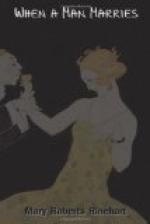“I am afraid I am not very interesting,” I said at last, when he showed no sign of breaking the silence. “The—the illness of the butler and—Miss Caruthers’ arrival, have been upsetting.”
He suddenly roused with a start from a brown reverie.
“I beg your pardon,” he said, “I—oh, of course not! I was wondering if I—if you were offended at what I said earlier in the evening; the—Brushwood Boy, you know, and all that.”
“Offended?” I repeated, puzzled.
“You see, I have been living out of the world so long, and never seeing any women but Indian squaws”—so there were no Spanish girls!—“that I’m afraid I say what comes into my mind without circumlocution. And then—I did not know you were married.”
“No, oh, no,” I said hastily. “But, of course, the more a woman is married—I mean, you can not say too many nice things to married women. They—need them, you know.”
I had floundered miserably, with his eyes on me, and I half expected him to be shocked, or to say that married women should be satisfied with the nice things their husbands say to them. But he merely remarked apropos of nothing, or following a line of thought he had not voiced, that it was trite but true that a good many men owed their success in life to their wives.
“And a good many owe their wives to their success in life,” I retorted cynically. At which he stared at me again.
It was then that the real complexity of the situation began to develop. Some one had rung the bell and been admitted to the library and a maid came to the door of the den. When she saw us she stopped uncertainly. Even then it struck me that she looked odd, and she was not in uniform. However, I was not informed at that time about bachelor establishments, and the first thing she said, when she had asked to speak to me in the hall, knocked her and her clothes clear out of my head. Evidently she knew me.
“Miss McNair,” she said in a low tone. “There is a lady in the drawing room, a veiled person, and she is asking for Mr. Wilson.”
“Can you not find him?” I asked. “He is in the house, probably in the studio.”
The girl hesitated.
“Excuse me, miss, but Miss Caruthers—”
Then I saw the situation.
“Never mind,” I said. “Close the door into the drawing room, and I will tell Mr. Wilson.”
But as the girl turned toward the doorway, the person in question appeared in it, and raised her veil. I was perfectly paralyzed. It was Bella! Bella in a fur coat and a veil, with the most tragic eyes I ever saw and entirely white except for a dab of rouge in the middle of each cheek. We stared at each other without speech. The maid turned and went down the hall, and with that Bella came over to me and clutched me by the arm.
“Who was being carried out into that ambulance?” she demanded, glaring at me with the most awful intensity.




